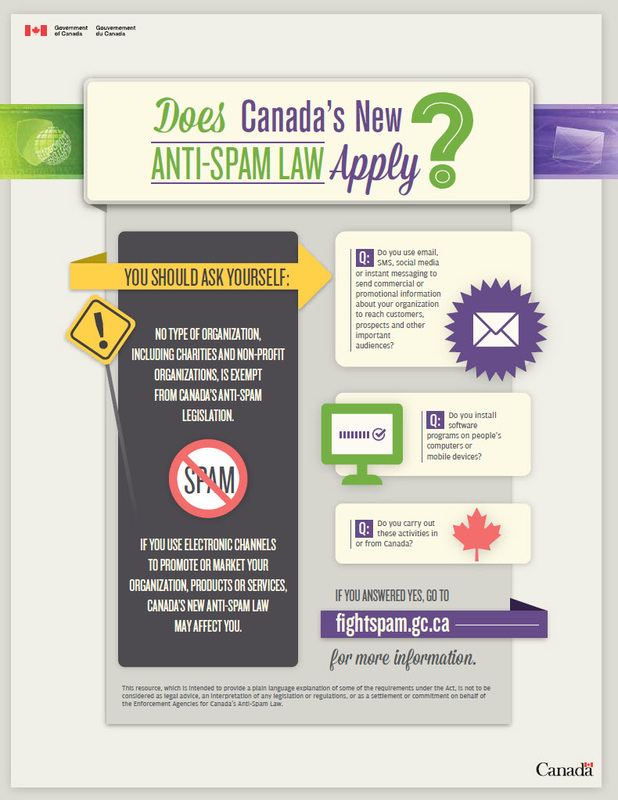I have heard concern from my Canadian clients over the coming implementation of Canada's Anti-Spam Law. Many worry it threatens to cripple their email marketing, even though I know they are above board in the way they collect contact's emails. I encourage everyone to take a deep breathe and get familiar with the law.
The Anti-Spam law will be in effect July 1, 2014. On January 15, 2015, sections of the Act related to the unsolicited installation of computer programs or software come into force.
When the new law is in force, it will generally prohibit the:
"The goal of the law is to catch blatant offenders. Senders that are making every effort to comply will not be the target of the law, and therefore shouldn’t panic.
There is a 3-year period transitional period after the enforcement date in which consent is implied for pre-existing business and non-business relationships until the recipient asks to be unsubscribed."
http://marketingland.com/everything-need-know-canadian-anti-spam-legislation
If you are not sending unsolicited emails to Canadian citizens, the best thing you can do is add a "you are receiving this email because..." clause to the beginning of your business emails. If you are really concerned you may want to send out an email having your contact list confirm their consent in receiving your emails. Most email marketing platforms have a process for this and make it really easy.
TAKE THE SPAM QUIZ
The Anti-Spam law will be in effect July 1, 2014. On January 15, 2015, sections of the Act related to the unsolicited installation of computer programs or software come into force.
When the new law is in force, it will generally prohibit the:
- sending of commercial electronic messages without the recipient's consent (permission), including messages to email addresses and social networking accounts, and text messages sent to a cell phone;
- alteration of transmission data in an electronic message which results in the message being delivered to a different destination without express consent;
- installation of computer programs without the express consent of the owner of the computer system or its agent, such as an authorized employee;
- use of false or misleading representations online in the promotion of products or services;
- collection of personal information through accessing a computer system in violation of federal law (e.g. the Criminal Code of Canada); and
- collection of electronic addresses by the use of computer programs or the use of such addresses, without permission (address harvesting).
"The goal of the law is to catch blatant offenders. Senders that are making every effort to comply will not be the target of the law, and therefore shouldn’t panic.
There is a 3-year period transitional period after the enforcement date in which consent is implied for pre-existing business and non-business relationships until the recipient asks to be unsubscribed."
http://marketingland.com/everything-need-know-canadian-anti-spam-legislation
If you are not sending unsolicited emails to Canadian citizens, the best thing you can do is add a "you are receiving this email because..." clause to the beginning of your business emails. If you are really concerned you may want to send out an email having your contact list confirm their consent in receiving your emails. Most email marketing platforms have a process for this and make it really easy.
TAKE THE SPAM QUIZ
by Rebecca LeClaire - Website Design Company Consultant and Startup, Online Business, SEO & Marketing Consultant




